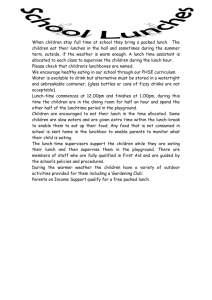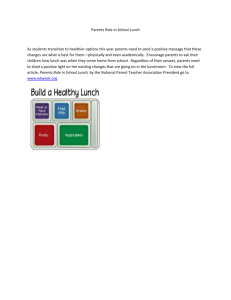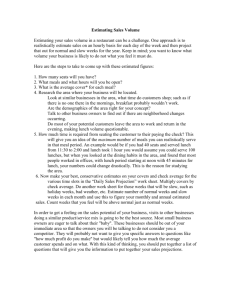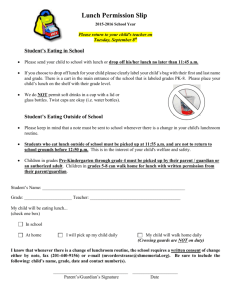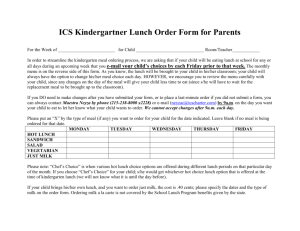Whole School Food Policy - Merrydale Infant School
advertisement
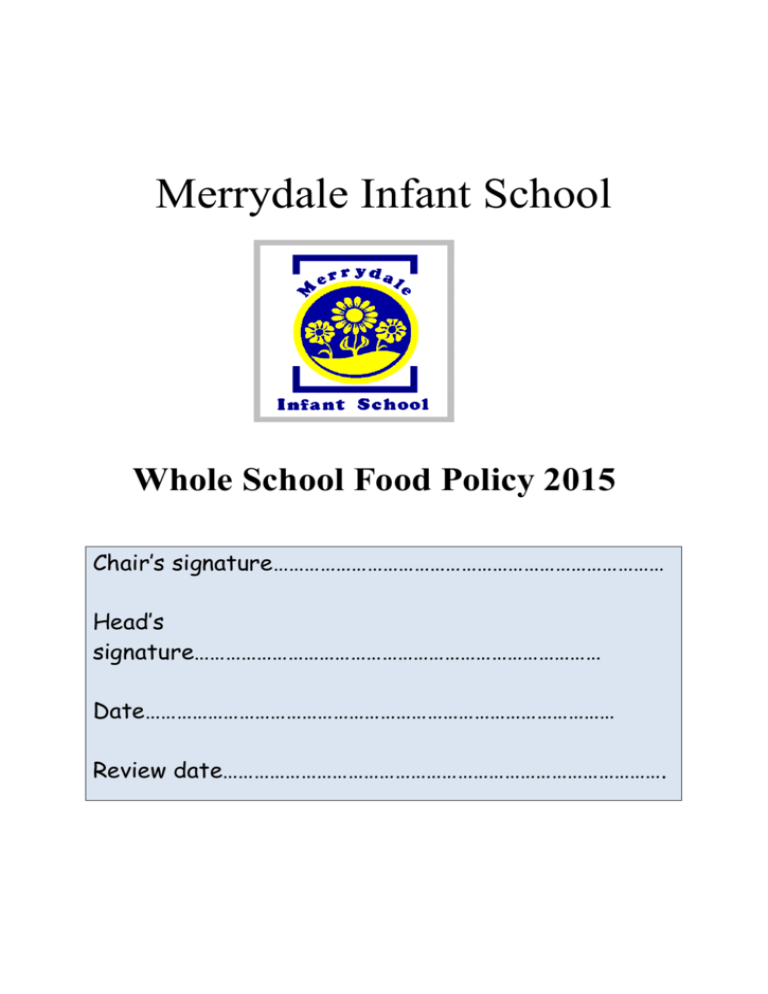
Merrydale Infant School Whole School Food Policy 2015 Chair’s signature………………………………………………………………… Head’s signature…………………………………………………………………… Date……………………………………………………………………………… Review date…………………………………………………………………………. 1 RATIONALE We wish to promote healthy eating to our children at Merrydale Infant School. In the past, as part of the curriculum and to improve the wellbeing of our children, we have incorporated: Healthy eating days Provision of fresh water through water fountains around the school for children Achieved accreditation as a Healthy School Activity weeks Teaching about balanced diets Science on food types Food tasting Cooking The Whole School Food Policy will cover the following: School meals Food provided at the school, other than school meals Healthy eating, as part of the curriculum Extra curriculum activities, such as cookery clubs, etc Non – school packed lunches will be covered in the Packed Lunch Policy. Our belief is that a balanced healthy, nutritious diet is important for the development of a childʼs physical state, as well as for their intellectual well-being. Feeding the body with the proper nutrients helps fuel the mind to be more receptive to learning new skills, hence Feed the Body, Fuel the Mind. 2 AIM To ensure that all aspects of food and drink in school promote the health and well being of pupils, staff and visitors. To support all parents of Foundation 2, Year 1 and Year 2 children to take up the the UFSM offer from Autumn Term 2014. To educate our children to understand the health benefits of a healthy diet. 3 OBJECTIVES 3.1 Working with the schoolʼs caterer 3.1.1 The school’s caterers meet the new nutritional standards for school meals from September 2007 and non-school meal food provided in school. 3.2 The school and its caterer have introduced school meal themes days/weeks, such as: Bonfire Night Chinese New Year International themes Taster days – including regular taster sessions during parents evenings to encourage a greater uptake of a hot balanced meal for our children during the school day Curriculum theme days 3.3 The school will continue to include work associated with healthy balanced diets in its curriculum The children will be taught: The components of a healthy diet The importance of healthy eating both now and in the future How to design a menu for school/at home lunch/Breakfast/evening meal About the cost of menus, food, mainly through role plat How to weigh and measure We have a gardening club where vegetables can be grown by the children Food on the plate games Food in history Extra curriculum activities, including: Class cooking/tasting activities. Catererʼs talks about the changes in school meals and nutritional standards Breakfast club. (5 Star Food Hygiene May 2013) The school will enlist the help of its school caterer/dietician/healthy living coordinator/school nurse or another professional to help promote healthy eating habits. The school will also arrange for advice and assistance about healthy eating issues to be provided to parents, if there is sufficient interest. 3.4 Packed Lunches From the Autumn Term 2014 following the introduction of UFSM, the school will provide limited facilities for pupils bringing in packed lunches but will ensure that free, fresh drinking water is readily available at all times. Please refer to the Packed Lunch Policy for further information. 3.5 The School will provide a safe and healthy eating environment for pupil, staff and visitors having lunch at midday in the school The school will provide a clean, sociable environment, indoors and out, for children to eat their lunch. In doing so, the school requests children adhere to the following rules: All children are required to sit at a table in order to eat their lunch. Children are encouraged to eat all or at least try to eat most of the food provided, either by the school or in their lunch box. Lunchtime supervisors will help any children who have concerns or cause concern during meal time, e.g. children who may have problems eating their lunch, spill or drop their lunch, cannot find a place to sit, do not eat their lunch or skip lunch, etc. Children are expected to behave whilst eating their lunches and to be polite and helpful If a child has a problem or wishes to leave they should raise their arm and wait until a lunchtime supervisor speaks to them If children are unsure of what the meal, or any meal item, is, they can ask the caterer or supervisory assistant to explain Caterers and supervisory assistants should thank children for using the facilities, as children should thank them for their help and assistance Children leave the area where they have eaten their lunch in a clean and tidy condition 3.6 The school will reward pupils for good meal time etiquette and good behaviour To encourage good behaviour and social interaction during the meal time: Children will be provided with a positive environment. Children will be encouraged to behave appropriately at all times. Adults will model positive behaviours. Children are rewarded with individual stickers or class rewards for behaving well. Children who disrupt lunch time will be reported to the class teacher. 3.7 The school will make arrangements for monitoring and evaluating the activities to ensure these objectives are met This policy, its procedures and activities, used to meet the schoolʼs Whole School Food Policy, will be monitored and reviewed every three years by the PSHE representative, school council and the governing body. Publication of the policy: The school will write to all new and existing parents/carers to inform them of the policy via the school newsletter. The policy will be available on the school’s website and will be incorporated into the school prospectus. The school will use opportunities such as parent evenings to promote this policy as part of a whole school approach to healthier eating. All school staff, including teaching and catering staff, will be informed of this policy and will support its implementation.


